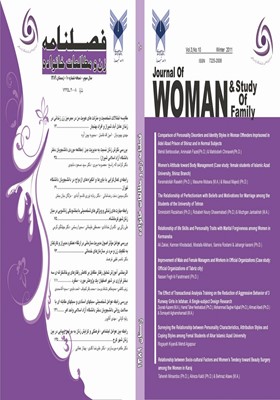رابطهی کمالگرایی با باورها و انگیزههای ازدواج در دانشجویان دانشگاه تهران
محورهای موضوعی : زن و خانواده
کلید واژه: کمالگرایی, انگیزههای ازدواج, باورهای نادرست.,
چکیده مقاله :
این پژوهش با هدف بررسی رابطه بین کمال گرایی با انگیزه ها و باورهای ازدواج در دانشجویان دانشگاه تهران انجام شده است. جامعه آماری مورد مطالعه عبارتست ازکلیه دانشجویان دوره کارشناسی دانشگاه تهران در سال تحصیلی90-1389 و نمونه آماری شامل 419 دانشجو (295نفر زن و 114نفر مرد) بود که به صورت تصادفی طبقه ای انتخاب شدند. آزمودنی ها به سه پرسشنامه مقیاس کمال گرایی چند بعدی تهران(MPS-H)؛ پرسش نامهمقیاس انگیزه ها و مقیاس باورهای نادرست ازدواج پاسخ دادند. جهت تجزیه و تحلیل دادهها و آزمون سؤالهای پژوهش ازضریب همبستگی و رگرسیون لجستیک استفاده شد. نتایج نشان داد مولفه های کمال گرایی می تواند میزان انگیزه های دانشجویان نسبت به ازدواج را پیش بینی کند، قدرت پیش بینی در هر یک از مولفه ها 4 درصد است.بین مولفه های کمال گرایی و باورهای نادرست ازدواج رابطه مثبت معناداری وجود دارد. همچنین مولفه کمال گرایی دیگرمدار در مقایسه با کمال گرایی خودمدار و اجتماع مدار قدرت پیش بینی بیشتری (7درصد) در باورهای نادرست ازدواج داشت.
The present study investigated the relationship of perfectionism with motivations for and beliefs about marriage among the students of the University of Tehran. The statistical population includes all undergraduate students of the University of Tehran in the academic year of 1389-1390. The estimated Sample size based on Morgan’s table is 419 students (295 females and 114 males). Stratified random sampling was used for the selection of samples. Three instruments were used: a) Tehran Multi-Dimensional Perfectionism Scale: TMPS.b) Marriage Motivations Scale, and c) Marriage Myths Scale. Correlation coefficient and logistic regression were used for data analysis. The results showed that the components of perfectionism can predict the rate of motivation for marriage. The power of prediction in each component is 4 percent. There is a significant positive relationship between the components of perfectionism and irrational beliefs about marriage. Other- oriented perfectionism has more power (7percent) in predicting irrational beliefs about marriage in comparison with social- oriented and self-oriented perfectionism.
- احتشامزاده،پروین؛ مکوندی، بهنام و باقری، اشرف(1389)، رابطه بخشودگی،کمالگرایی و صمیمیت با رضایت زناشویی در جانبازان و همسران آنها. نشریه یافتههای نو در روانشناسی (1389). 136-123.
- بشارت، محمدعلی (1386)، ساخت و اعتبار یابی مقیاس کمالگرایی چند بعدی تهران. پژوهشهای روانشناختی، دوره 10، شماره 1و 2.
- بهزاد، داوود (1388)، ساخت و هنجاریابی پرسشنامه انگیزهمندی ازدواج، فصلنامه رواندرمانی و مشاوره خانواده، زیر چاپ.
- - بهزاد، داوود (1389). معادله چند مجهولی ازدواج،اولین سمینار کشوری آموزش قبل از ازدواج. کرمان دانشگاه علوم پزشکی با همکاری سازمان بهزیستی.
- پناهی، حلیمه(1383)، اثر موفقیت و شکست بر پاسخهای فیزیولوژیک در افراد کمالگرا و غیرکمالگرا. پایاننامهی تحصیلی کارشناسی ارشددانشگاه تربیت مدرس.
- جعفرینژاد، کامران و اردشیرزاده، منصوره(1383)، آشنایی با آموزش خانواده. تهران :سازمان بهزیستی کشور.
- مهرابیزادههنرمند، مهناز و وردی، مینا(1382)، کمالگرایی مثبت، کمالگرایی منفی (چاپ اول). اهواز: نشر رسش.
- میرمحمدصادقی، مهدی (1388)، آموزش پیش از ازدواج. تهران: نشر معاونت امور فرهنگی و پیشگیری سازمان بهزیستی کشور و مرکز مشاوره دانشگاه تهران.
- Addis, Jane; (2002), Maripal adjustment and irrational Belefs. Journal of Rational-Emotive & Cognitive-Behavior Therapy, 20:1.
- Ashbay, J. S., Rice, K. G., & Kutchins, C. B (2008), Matches and mismatches: partners, perfectionism, and premarital adjustment. Journal of Counseling psychology, 55(1): 125- 132.
- Dimitrovsky, L., Levy-Shiff, R., & Schattner- Zanany, I.(2002), Dimensions of Depression and Perfectionism in pregnant and Nonpregnant Women: Their Levels and Intrrelationships and Their Relationship to Marital Satisfaction. Journal of Psychology, 136(6), 631- 646.
- Flett, G. L., & Hewitt, p. L.(2001), Perfectionism, Beliefs, and Adjustment in Dating Relationships. Current Psychology, 20(4):289-311
- Frost, R. O. Marten, P.A, Lahart, C. & Rosenblate R.(1990),The dimentions of perfectionism. Cognitive theraphy and research, 14:444-468.
- Frost, R. O. Heimberg, R. G., Holt, C. S., Mattia, J.I., & Neubauer A.L.(1993), A Comparison of two measures of perfectionism. Personality and individual Differrnces, 14:119-126.
- Haring, M., Hewitt, P. L., & Flett, G. L. (2003), Perfectionism, Coping, and Quality of Intimate Relationships. Journal of marriage and family, 65(1): 143-158.
- Hewitt, p. (2009), Perfectionism. Canadian Psychological Association. University of British Columbia.
- Martin, J. L., & Ashby, J.S. (2004), Perfectionism and fear of intimacy: implications for relationships. The Family Journal, 12(4):368- 374.
- Shafran, R., Cooper, Z., & Fairburn, C. G. (2002), Clinical perfectionism: cognitive-behavior analysis. Behavior research and Therapy, 40:773-791.
- Slaney, R. B., Ashby J.S., & Trippi J.(1995), perfectionism: Its measurement and career relevance. Journal of career Assessment, 3:279-297.
- Stoeber, J., & Otto K.(2006), Positive conceptions of perfectionism: Approaches, evidence, challenges. Personality and Social Psychology Review, 10:259-319.
- Stoeber, J., Stoeber F. S. (2009), Domains of perfectionism: prevalence and relationships with perfectionism, gender, age and satisfaction with life.Journal of Personality and Individual Differences, 46:530-535.
- Stump, H., & Parker, W.D. (2000), A hierarchical structural analysis of perfectionism and its relation to other personality characteristics. Journal of personality and Individual Differences, 28:837-852.
- Terry-short, L.A. Owens, R.G.,Slade.P.D., & Dewey, M.E. (1995), Positive and negative Perfectionism. Journal of personality and Individual Differences, 18:663-668.

